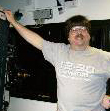|
|
This topic comprises 3 pages: 1 2 3
|
|
Author
|
Topic: First Film Released In 1,000 Theatres
|
|
|
|
|
Michael Coate
Phenomenal Film Handler

Posts: 1904
From: Los Angeles, California
Registered: Feb 2001
|
 posted 08-04-2003 12:25 PM
posted 08-04-2003 12:25 PM




I have what I think might be the correct answer to the question, and yes, the info was gleaned from the trades. However, I do not know if this title was the first to top 1,000, which is why I asked the question in an effort to generate a discussion.
The title I suspect might have been the first to top 1,000 prints was Raiders Of The Lost Ark, released June 1981, with 1,078 engagements. Didn't want to blurt it out in the initial post since I was curious to see how a discussion would develop.
BTW, the 1978, '79 and '81 re-releases of Star Wars all topped 1,000 prints and preceded the release of Raiders, but I consider this to be a technicality and I don't wish to count it. Big event films from that same timeframe such as Grease, Jaws 2, Star Trek: The Motion Picture, etc., all had engagements in the high hundreds but shy of 1,000. The Empire Strikes Back in '80 was a platform release.
I'll check out the possibility of something like The Blues Brothers or Airplane!.
[ 08-05-2003, 12:49 AM: Message edited by: Michael Coate ]
| IP: Logged
|
|
|
|
|
|
|
|
|
|
|
|
|
|
Michael Coate
Phenomenal Film Handler

Posts: 1904
From: Los Angeles, California
Registered: Feb 2001
|
 posted 08-04-2003 07:48 PM
posted 08-04-2003 07:48 PM




quote:
It was 'Empire Strikes Back' that got re-released in July 1981. 'Star Wars (A New Hope)' was reissued in 1982, with an 'extra reel' that was a 15-minute 'preview featurette' for the then-titled 'Revenge Of The Jedi'.
Huh??!!
Star Wars was indeed re-released in those years I mentioned. You're not actually claiming it wasn't re-released in those years, are you??? I have the one-sheets... I have photocopies of newspaper ads from numerous cities... I have no clue what your point is in regard to this discussion re first movie to get released with 1,000 prints.
And I don't remember a 15-minute Jedi featurette. The August/September 1982 re-release presentation I saw of Star Wars began with a standard-length Revenge trailer, the same trailer included with the fall '82 Empire re-release.
quote:
Jaws was the first film to top the $100,000,000 mark thus becoming the first summer blockbuster.
While it is true that Jaws is generally regarded as the first "blockbuster," it was not the first film to break $100,000,000.
I believe The Sound Of Music, The Godfather, and The Exorcist all grossed over $100 million in their original runs prior to the release of Jaws. Jaws hit $100 million mark faster than the others, though.
| IP: Logged
|
|
|
|
|
|
Darryl Spicer
Film God

Posts: 3250
From: Lexington, KY, USA
Registered: Dec 2000
|
 posted 08-04-2003 09:26 PM
posted 08-04-2003 09:26 PM



an interesting read below. It states in this artical that Jaws was the first film to top the $100,000,000 dollar mark and it seems I remember readin the same thing in the Jaws laserdisc box set that I have.
By Peter Howell
Toronto Star Movie Critic
All these years later, the scene still has the power to shock, titillate and make us gulp popcorn.
A buxom teen named Chrissie runs nude across a beach and dives into ocean waters barely lit by a setting sun. She swims out a few metres, then turns to smile at a friend left on the sand, who is struggling to strip off his clothes.
Chrissie's smile suddenly vanishes as she feels a powerful tug from below. She begins screaming as she realizes the tugs are coming from the teeth of something huge, something she can't see.
Chrissie is being eaten alive. The movie, as millions know, is Jaws.
"She Was The First"' screamed the advertising tag line in summer 1975, when Jaws was released with its horrific promise of multiple shark munchings.
But, in retrospect, it was really the movie itself that was the harbinger of things to come. Films and filmgoing have never been the same since.
A quarter century after Jaws first devoured its box office competition, it seems incredible to think of a summer without big movies and big monsters: literal beasts like Disney's $200-million Dinosaur, which opens today; or Godzilla 2000, which will be let loose in August; and star-driven ``500-pound gorillas'' like the Tom Cruise vehicle Mission: Impossible 2, which opens next Wednesday.
Dinosaur and M:I-2, as well as the hit Gladiator which arrived two weeks ago, herald the start of the 2000 blockbuster season: 16 weeks of movies making noise to match their vast budgets, pushed by saturation advertising and tie-ins with hamburgers, pop and toys.
This year's take-no-prisoners contenders include Jim Carrey's laugher Me, Myself And Irene (June 30); George Clooney's weather watch The Perfect Storm (June 30); Mel Gibson's battle epic The Patriot (June 30); and the latest comic book blow-up X-Men (July 14). You will know all about these movies even if you don't go to see them.
Back in 1975, though, there was no summer movie season to speak of and "blockbuster"' was an urban renewal term. The hot months were the time to go to the cottage or just stay home, watching television in cool basements.
Theatre owners tried all sorts of enticements - air-conditioning, free parking, contests - but moviegoing in general was way down. Weekly attendance had peaked at 78.2 million people in 1946, boosted by returning World War II soldiers, but competition from television and the flight to the theatre-scarce suburbs had slashed the figure to 15.8 million by 1971.
Movie studios in 1975 were still "platforming"' their films, releasing them in a few theatres in large cities and hoping for positive newspaper reviews and strong word-of-mouth that could be used to carefully expand to the hinterlands. Films were given a chance to find and build an audience.
Jaws changed everything. Universal Studios realized it had a hit on its hands, a genuine fright flick by a 28-year-old comer named Steven Spielberg. It had been murder to make - there had been major cost overruns, mechanical problems and weather delays - but it was sending test audiences into raptures of fear and shivers of delight.
Despite many misgivings, which he expressed loudly later, Spielberg had made a film that tapped deep into a collective dread, the fear of being consumed by an unseen Other.
Few people may remember the stars of Jaws - Roy Scheider, Robert Shaw and Richard Dreyfuss - or its frankly ludicrous plot of a town more afraid of losing tourist dollars than tourist lives. But no one could ever forget the gut-tightening sight of watching Chrissie (played by former Penthouse pin-up Susan Backlinie) as she became an aquatic appetizer.
In his new memoirs Which Lie Did I Tell? veteran Hollywood screenwriter William Goldman describes the audience reaction to the first New York screening of Jaws, which he was invited to attend in the spring of 1975.
"I never remember any music hitting an audience like those first guttural notes of John Williams' great score," Goldman writes. "There were gasps two seconds in. And nobody spoke for two hours. Laughed a little. Screamed a lot. And 124 minutes later, when the lights came up, we all knew something remarkable was about to go out into the world."
Universal decided to go big right out of the gate, to capitalize on the advance buzz. On June 20, 1975, the studio released Jaws to a then unheard of 455 screens across North America. The previous widest release had been for The Towering Inferno the previous December, with 295 screens.
The Jaws release was backed by a $700,000 TV, radio and print advertising campaign, a phenomenal amount for the time. The pitch focused on the visceral image of the unsuspecting Chrissie swimming above the waterline as a great white shark zeroed in on her from below.
The movie also had the push of Peter Benchley's hit novel from which it was spawned, still on the bestseller lists.
Jaws was calculated to be a smash, but the movie made money beyond its makers' most avaricious dreams. It quickly became the first film in history to hit the $100 million mark at the box office, a much more difficult feat in the era of $3 tickets than today's $11 ducats.
For two years it topped the all-time movie box office chart, until Spielberg's friend George Lucas came out with Star Wars, which built on Jaws' bigger-louder-wider formula. Jaws remained in the box office Top 10 for most of the last quarter century, being knocked out only recently by the Star Wars prequel The Phantom Menace and the horror hit The Sixth Sense.
Jaws was by no means the first movie blockbuster; D.W. Griffith's racist epic The Birth Of A Nation laid claim to that title way back in 1915. But Jaws was the first real summer blowout, and the first to use the smash-and-grab approach of immediate wide release coupled with full-tilt advertising. It presented itself as a must-see event that didn't depend on whether the movie was any good or not.
Studio executives took heed. Why waste time trying to win over your audience when you could bludgeon it into submission? All you needed to prompt the appropriate Pavlovian responses - hands into popcorn bucket, eyes to screen - was a big picture that would bypass the brain and go straight for the bloodstream.
Jaws sequels, spin-offs and rip-offs abounded, as the movie that begat the summer blockbuster (or "tentpole," to use Variety's term) also ushered in the era of the "high concept" film, one that could be pitched in a single shot, like a bullet to the brain.
As author Charles Fleming writes in High Concept, his recent biography of megamovie mogul Don Simpson (Con Air, The Rock), the name Jaws was uttered like a sacred oath in studio inner sanctums.
"Previous (Hollywood) executives had attempted to boil down plot and character to easily encapsulated ideas, warning writers and producers not to proceed with anything that couldn't be written down on a single piece of paper or the back of a book of matches.
"Now it had really been done. Jaws was `shark attack.' Alien was `Jaws in a spaceship' . . . The search for the next Jaws was on."
The search continues to this day, with such obvious imitators as last summer's Lake Placid and Deep Blue Sea, this year's Godzilla 2000 and Spielberg's own hugely successful returns to monstermania, Jurassic Park and The Lost World.
And for every blockbuster hit, there's at least one blockbuster dud, such as last week's John Travolta vanity project Battlefield Earth which crashed-and-burned at theatres everywhere.
The $100 million mark that seemed like the four-minute mile when Jaws crossed it has become the benchmark for movie success. Big-ticket pictures are now typically released to 3,000 or more theatres - nearly seven times Jaws' jaw-dropping rollout - to virtually guarantee an immediate No. 1 ranking at the box office.
Most movies that have reached or surpassed the $100 million mark in the past 25 years have been squarely in the blockbuster category of huge budgets, high concepts and major marketing programs.
The career boost he received from Jaws helped make Spielberg the most-watched man in Tinseltown, as both director and producer.
His numerous blockbuster successes bankrolled the 1995 creation of DreamWorks SKG, Spielberg's studio partnership with Jeffrey Katzenberg and David Geffen that lately can do no wrong. DreamWorks has the current No. 1 box office victor with the Ridley Scott epic Gladiator and also the reigning Oscar champ American Beauty.
But there was a price to be paid for the success of the Jaws formula, and it was paid in artistic terms. The studio risk-taking that had characterized the first half of the 1970s - evidenced by such classic films as Martin Scorsese's Taxi Driver, Francis Ford Coppola's The Godfather and Robert Altman's Nashville - gave way to playing safe bets by the latter half of the decade, and the 20 years that followed.
Getting those safe bets meant spending increasingly more money on production, upping the ante with more elaborate special effects and $20-million salaries for stars that could ``open'' pictures with a splash.
"As costs mounted, the willingness to take risks diminished proportionately," writes author Peter Biskin in Easy Rider, Raging Bulls, his astute recent history of 1970s Hollywood.
"Morever, Jaws whet corporate appetites for big profits quickly, which is to say, studios wanted every film to be Jaws."
Biskin quotes disillusioned director Peter Bogdanovich (The Last Picture Show) who says the same thing in blunter terms: ``Jaws was devastating to making artistic, smaller films. They forgot how to do it. They're no longer interested.''
Even Spielberg expresses regret for the way Jaws changed movies. Speaking in John Baxter's 1996 biography Steven Spielberg, the wunderkind-turned-mogul says the ``violent, nasty, crude'' shark movie he struggled to make in 1974 was simply a means to an end, his ticket to the mainstream and the money to fund the pictures he really wanted to make.
These included his future blockbusters, Close Encounters Of The Third Kind and Jurassic Park.
"It was a calculated movie," Spielberg says of Jaws. "I made each cut with glee, knowing the effect that it would have on the audience. I don't ever want to be involved in another picture like that."
But it would be wrong to blame the dumbing-down and blowing-up of Hollywood entirely on Jaws. Indeed, the big fish movie is today a quaint example of old-time moviemaking values, since it was made entirely without computers: that scary shark was just a big rubber prop nicknamed Bruce, which had to be hidden for most of the movie (a great suspense device, as Spielberg later realized) because it didn't work properly.
Jaws could also be credited with boosting its polar opposite: the small or quirky comedy or drama that studios now use as counter programming, to appeal to moviegoers who don't want to join the blockbuster hordes on summer weekends.
In 1975, The Rocky Horror Picture Show, now the most successful cult film of all time, was launched with the tagline "A Different Set Of Jaws," and a clever visual pun of Tim Curry's rouged lips imitating the lethal Jaws choppers.
The counter-programming offensive continues to pay big dividends. Just last year, this strategy was put to good use against the Star Wars prequel The Phantom Menace, the blockbuster to beat all blockbusters. The Julia Roberts-Hugh Grant romantic comedy Notting Hill opened the same weekend, attracting many grateful refugees from multiplex mayhem.
And give Jaws its due, which many will again do this summer when it is released on DVD in July, in a special edition hyped with even more mass marketing.
Nothing can match the dum-dum, dum-dum terror of knowing that something big and brutal lies lurking, waiting to attack. Sort of like the mixed emotions of bracing yourself for the onslaught of all the other summer blockbusters headed our way.
| IP: Logged
|
|
|
|
|
|
|
|
All times are Central (GMT -6:00)
|
This topic comprises 3 pages: 1 2 3
|
Powered by Infopop Corporation
UBB.classicTM
6.3.1.2
The Film-Tech Forums are designed for various members related to the cinema industry to express their opinions, viewpoints and testimonials on various products, services and events based upon speculation, personal knowledge and factual information through use, therefore all views represented here allow no liability upon the publishers of this web site and the owners of said views assume no liability for any ill will resulting from these postings. The posts made here are for educational as well as entertainment purposes and as such anyone viewing this portion of the website must accept these views as statements of the author of that opinion
and agrees to release the authors from any and all liability.
|

 Home
Home
 Products
Products
 Store
Store
 Forum
Forum
 Warehouse
Warehouse
 Contact Us
Contact Us




 Printer-friendly view of this topic
Printer-friendly view of this topic













![[Smile]](smile.gif) Question is are all those rental figures based on there original release or all the re-releases thrown in. Not sure, but the Jaws figures for hitting the mark were from it's original release. ALso would that number be all the grosses or the, as you say, Rental for the film.
Question is are all those rental figures based on there original release or all the re-releases thrown in. Not sure, but the Jaws figures for hitting the mark were from it's original release. ALso would that number be all the grosses or the, as you say, Rental for the film.



